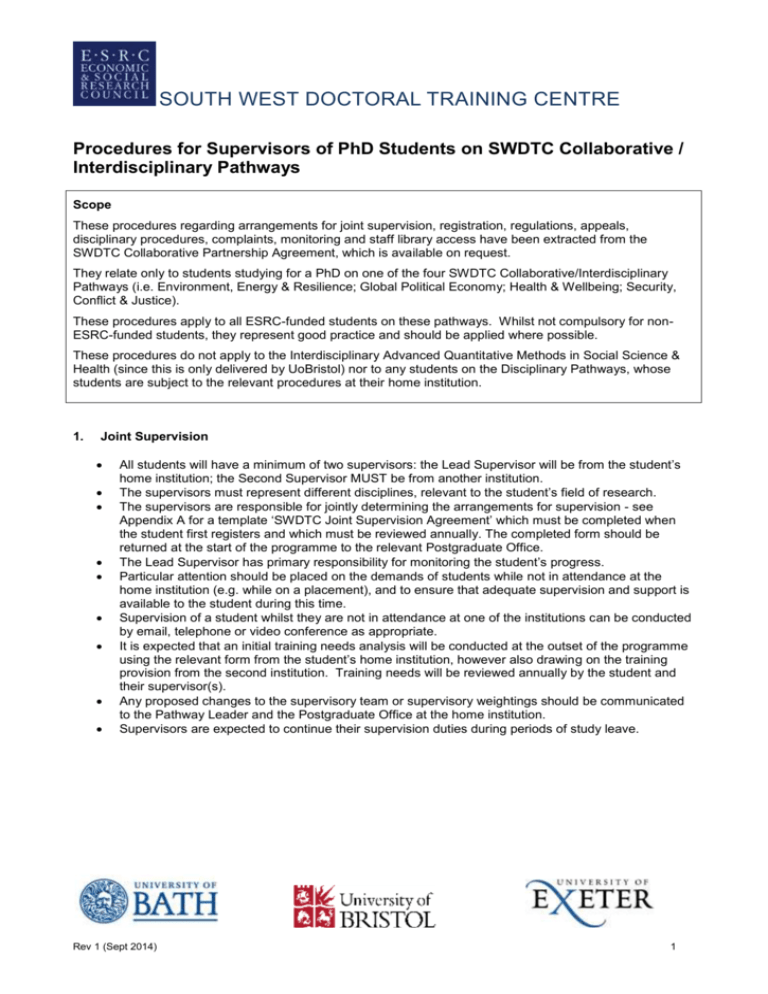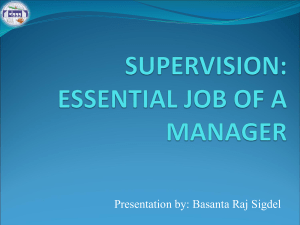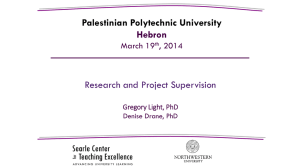Procedures for Supervisors of PhD Students on SWDTC
advertisement

SOUTH WEST DOCTORAL TRAINING CENTRE Procedures for Supervisors of PhD Students on SWDTC Collaborative / Interdisciplinary Pathways Scope These procedures regarding arrangements for joint supervision, registration, regulations, appeals, disciplinary procedures, complaints, monitoring and staff library access have been extracted from the SWDTC Collaborative Partnership Agreement, which is available on request. They relate only to students studying for a PhD on one of the four SWDTC Collaborative/Interdisciplinary Pathways (i.e. Environment, Energy & Resilience; Global Political Economy; Health & Wellbeing; Security, Conflict & Justice). These procedures apply to all ESRC-funded students on these pathways. Whilst not compulsory for nonESRC-funded students, they represent good practice and should be applied where possible. These procedures do not apply to the Interdisciplinary Advanced Quantitative Methods in Social Science & Health (since this is only delivered by UoBristol) nor to any students on the Disciplinary Pathways, whose students are subject to the relevant procedures at their home institution. 1. Joint Supervision All students will have a minimum of two supervisors: the Lead Supervisor will be from the student’s home institution; the Second Supervisor MUST be from another institution. The supervisors must represent different disciplines, relevant to the student’s field of research. The supervisors are responsible for jointly determining the arrangements for supervision - see Appendix A for a template ‘SWDTC Joint Supervision Agreement’ which must be completed when the student first registers and which must be reviewed annually. The completed form should be returned at the start of the programme to the relevant Postgraduate Office. The Lead Supervisor has primary responsibility for monitoring the student’s progress. Particular attention should be placed on the demands of students while not in attendance at the home institution (e.g. while on a placement), and to ensure that adequate supervision and support is available to the student during this time. Supervision of a student whilst they are not in attendance at one of the institutions can be conducted by email, telephone or video conference as appropriate. It is expected that an initial training needs analysis will be conducted at the outset of the programme using the relevant form from the student’s home institution, however also drawing on the training provision from the second institution. Training needs will be reviewed annually by the student and their supervisor(s). Any proposed changes to the supervisory team or supervisory weightings should be communicated to the Pathway Leader and the Postgraduate Office at the home institution. Supervisors are expected to continue their supervision duties during periods of study leave. Rev 1 (Sept 2014) 1 SOUTH WEST DOCTORAL TRAINING CENTRE 2. Registration Students will be registered at all universities involved in delivering the pathway and supervising the student, to enable full access to relevant facilities and resources. The Postgraduate Offices will arrange this and it will include library access, IT, Students’ Union / Guild, skills training, sports and any other facilities. 3. Regulations The regulations of the home institution will apply. These can be found online as follows: University of Bath: Codes of Practice (in particular QA7) http://www.bath.ac.uk/quality/cop/statements.html Regulations (in particular Reg.16) at http://www.bath.ac.uk/regulations/ University of Bristol: Regulations and Code of Practice at http://www.bristol.ac.uk/esu/pg/cop-research-degrees.html University of Exeter see Postgraduate Research Students at http://as.exeter.ac.uk/academic-policystandards/tqamanual/pgrstaff/ Both supervisors must ensure that they adhere to the regulations of the student’s home institution 4. Progression and Assessment 5. Academic Appeals, Disciplinary Procedures and Complaints 6. Any student appeals, disciplinary procedures or complaints will be handled in the normal way under the home institution’s regulations. If a complaint relates to the second institution, colleagues there should be notified via the relevant Postgraduate Office. However, the home institution is responsible for investigating and seeking to find a resolution to the complaint. Monitoring of Research Students 7. The regulations of the home institution will apply w.r.t. the Transfer / Confirmation / Upgrade progression points mid-way through the studies. Where possible, one of the examiners should be from the second university (i.e. where the second supervisor is located). Separate SWDTC procedures are available for the viva voce examination of collaborative interdisciplinary PhD students (see http://www.swdtc.ac.uk/). The progression of ESRC-funded SWDTC students is closely monitored by the institutions, and is reviewed regularly by the Academic Advisory Board: as part of this process supervisors will be asked for updates as appropriate from the relevant Postgraduate Office. In addition, students will undergo annual / interim monitoring processes and these will be handled in the normal way under the home institution’s regulations. The Second Supervisor will be asked to contribute as required. In cases of unsatisfactory progress, the procedures of the home institution will apply. Staff Library Access Staff teaching or supervising on the Collaborative Interdisciplinary Pathways can arrange borrowing rights at the libraries of the other institutions. If they wish to be given access they should contact the relevant Postgraduate Office to arrange this. Staff on Disciplinary Pathways can also request access and this will be considered on a case by case basis. Rev 1 (Sept 2014) 2 SOUTH WEST DOCTORAL TRAINING CENTRE 8. Funding Available to ESRC Funded Students A variety of funding sources are available to ESRC-funded SWDTC students. In all the following examples, further details are available on the SWDTC web page at http://www.swdtc.ac.uk/, in particular in the Student Handbook at http://www.swdtc.ac.uk/information_for_current_students/. Alternatively, contact your institutional SWDTC contact - Hannah Quinn (Bristol), Ana Bullock (Bath), Eli McCutchion (Exeter) - or the SWDTC Manager – Sonja Ho. Research Training Support Grant (RTSG) – originally for £750 per year for each year of the PhD (+3) stage of the studies. From 2012/13 this was extended to include students on the taught (‘1’) stage of their studies. From 2013/14 the cap of £750 per year was removed. The SWDTC are currently (summer 2014) revising the procedures for applying for RTSG – details to follow. Difficult Language Training (DLT) Overseas Fieldwork (OFW) Overseas Institutional Visit (OIV) other funding, usually emailed to all students, such as calls for bids against Advance Training activities, student-led Interdisciplinary Collaboration activities, SWDTC Placement/External Engagement funding and ESRC Internship schemes. Rev 1 (Sept 2014) 3 SOUTH WEST DOCTORAL TRAINING CENTRE SWDTC Joint Supervision Agreement Before completing the form, the student and supervisors should consult the regulations of the home institution concerning the supervision of research students. A copy of this agreement should be retained by the Student, the Lead Supervisor, the Second Supervisor and the Postgraduate Office of the home institution. Name of Student Student Registration Number (at home institution) Programme Title Proposed Thesis Title Student Status (delete as appropriate) Full Time / Part Time Part 1 Lead Supervisor Staff Status (Lecturer / Senior Lecturer / Reader/ Professor) Faculty / College / School University Proposed % Division of Labour (e.g. 70% / 30%) Lead: % Second: % Part 2 Second / Co-Supervisor Staff Status (Lecturer / Senior Lecturer / Reader/ Professor) Faculty / College / School University Rev 1 (Sept 2014) 4 SOUTH WEST DOCTORAL TRAINING CENTRE Respective Roles and Responsibilities Agreed with Supervisors 1. Frequency of meetings / contact with the student 2. Arrangements for seeking and commenting on written work 3. Arrangements for consultation between supervisors Rev 1 (Sept 2014) 5 SOUTH WEST DOCTORAL TRAINING CENTRE Supervision Agreement Frequency of contact between each student and each supervisor (and mentor where relevant) With Lead Supervisor With Second Supervisor Form of Contact Frequency of Submission of Written Work Procedure for Dealing with Urgent Problems Rev 1 (Sept 2014) 6 SOUTH WEST DOCTORAL TRAINING CENTRE Initial Assessment of Subject Specific Training Needs Identified and How they will be Met (e.g. attend / pass a specific PGT module) Future assessment: training needs will be identified and agreed as the research progresses Viva Voce Arrangements (for Discussion in Final Year)* * see separate “Procedures for the Viva Voce Examination of PhD students on SWDTC Collaborative / Interdisciplinary Pathways” Please note the Viva Voce will normally take place at the home institution Signatures Student Date Lead Supervisor Date Second Supervisor Date Rev 1 (Sept 2014) 7







